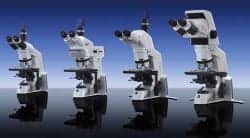New research has pinpointed four genes linked to prostate cancer, which could significantly improve diagnosis and treatment of this common cancer by identifying slow growing cancers that don’t need to be treated, and by developing targeted therapies for aggressive forms of the disease. The study appears in the June issue of the American Journal of Clinical Pathology, published by the American Society for Clinical Pathology (ASCP).
If the results are validated by larger studies, they could have significant medical and cost savings implications, potentially leading to the development of a simple lab test to determine the best course of treatment for men with prostate cancer.
One of the four genes, HEY2, shows particular promise as an indicator of aggressive prostate cancer, much as HER2 has been linked to aggressive breast cancer. As with HER2, therapies could be developed to target this form of prostate cancer, which is highly resistant to current therapies.
If the results are verified, men who are identified as having slow-growing cancers can continue to be watched and tested, rather than undergo aggressive treatment, she noted.
In the study, researchers analyzed biopsy specimens of 240 patients who had been diagnosed with prostate cancer and had surgery to remove their prostates, and then followed their progress with the disease. Researchers analyzed antibodies to the protein products of 20 genes in both benign and malignant cells from each patient and then compared their findings to patient outcomes. Four genetic markers were clearly associated with prostate cancer prognosis—two of which were associated with slow-growing cancer and two with aggressive cancer—and all 240 patients tested positive to one or more antibodies to the four.
Of the 240 patients, 156 (65%) remained disease-free throughout the duration of their follow-up (from five years to 11 years and 10 months, after surgery) and were more likely to test positive for the slow-growing genetic markers and less likely to test positive for the aggressive genetic markers. In 84 of the men (35%), the disease progressed to biochemical failure (the PSA level rose but no tumor mass was detected), local tumor recurrence in the area of the prostate, or distant spread/metastasis, beyond the pelvis. Fifteen of the men had only biochemical failure; 45 had additional local recurrence and 24 had additional distant metastasis—the most aggressive and life-threatening cases—although none of the patients in the study died from prostate cancer during the study follow up period. Patients in this group were more likely to test positive for STMN1 and HEY2, and 32% of patients whose cancer spread distantly tested positive for HEY2.
Source: ASCP


